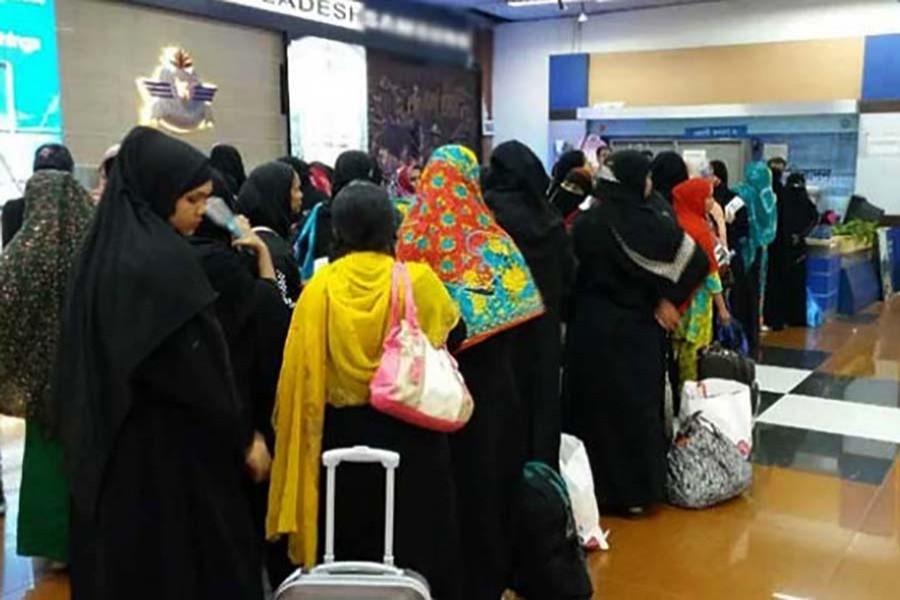Women domestic helps who returned home were denied justice in the Kingdom of Saudi Arabia (KSA), workers and rights activists said.
Though a significant number of women workers came back home from the oil-rich country due to exploitation, not a single case was filed against their employers, they said.
According to them, since January of the current calendar year at least 1,500 maids have returned home only from Bangladesh embassy's safe home in Riyadh and Saudi immigration camps.
Most of these women faced tortures like sexual, psychological and physical abuses. Lack of proper food and wages also forced them to return home.
The workers and rights campaigners said if punishment is not ensured, Saudi employers will continue torturing housemaids.
Bangladesh embassy should make an all-out effort to bring the offenders to book, they observed.
Human rights lawyer Salma Ali said Bangladesh embassy should not deny access to justice for victim women.
"If necessary, the government should train up labour officials to help the women run legal procedures properly," she said.
Until or unless justice is ensured, Bangladeshi women workers will not feel safe at their workplaces in Saudi Arabia ,Ms Ali noted.
Talking to the FE, several women alleged that Bangladesh embassy did not take any initiative to bring the employers to justice.
Officials at the safe homes listened to their stories, but they did not file any case with the labour court there.
They still want to tell their stories before the court. They also want to show their bodies wounded by their masters and get back wage dues.
Rubina Begum (penname), who hails from Gaibandha district, said at least 455 women took shelter at the same safe home where she resided in. But no woman got legal assistance.
Many of them became traumatised because of maltreatment. Broken legs and burnt bodies were also common problems being faced by migrant women, she mentioned.
"Officials interviewed us, but they did not take any action against the employers," Rubina said.
Had the embassy helped them, she thinks, every woman might have lodged a complaint against their masters and recruiting agents concerned.
When asked, the woman said she was forced to work about 20 hours a day. "My madam beat me when I requested for taking rest."
After some days, the situation became unbearable when her madam's husband returned from the USA.
"The man offered me to have a sexual relationship. I rejected her offer. But he insisted regularly," she mentioned.
"After that I fled from the house," she added.
Saleha Begum (penname), another Saudi returnee woman, also echoed the same, saying that no worker residing in safe home was provided with legal assistance and compensation.
Instead of legal support, police arrested the women on theft charges, she said. Even the embassy did not want to hear their problems, she added.
"Staffers of the safe home only ask about dues of wages. At the same time, they also suggested that the women should not claim wages as it will take long time in repatriating them home," she added.
"Of course, I want justice as I am still bearing wounds in different parts of my body. I am also suffering from backache," the woman said in reply to a query.
Shariful Islam, head of BRAC Migration Programme, said so far there is no example of bringing any employer to justice for abuse of Bangladeshi women workers.
If punishment was ensured, exploitation would not increase in such a way, he said.
A large number of women returned home in last six months. Still the influx of women continues. So, Bangladesh should take necessary action to bring the offenders to book.
"If necessary, they can collect DNA in case of rape victims," he added.
Preferring anonymity, a representative of BRAC Migration Programme, said at least 21 women became traumatised severely and underwent treatment at the National Institute of Mental Health (NIMH).
Some of them became pregnant and they are now abandoned by their families, said the BRAC official who received some of these women.
The future of women who returned home is now uncertain. The families and societies are considering them as a burden. If these women get compensation, they can survive, he added.
The officials at the Ministry of Expatriates' Welfare and Overseas Employment said women don't want to go for legal action against their employers as they want to come back home quickly.
The officials also said a few number of women were subjected to abuse which is very 'natural'.
When contacted, Aminul Islam, additional secretary of the ministry, said Bangladesh embassy has sufficient logistics and legal experts to address legal issues.
But women don't want to file any case against their employers as they want to come back home quickly, he said.
"When a woman will lodge a case, she will not get a job. So, how will the woman stay in that country?" he posed a question.
Shakirul Islam, chairman of Ovibashi Karmi Unnayan Programme (OKUP), said if women don't want to be plaintiffs, the embassy itself should lodge cases.
Through power of attorney, the embassy can also continue the cases if women return home, he explained.
"So, there is no obstacle to run the cases if women are not present in that job destination country," Mr Islam said.
Bangladesh and Saudi Arabia inked a deal on recruitment of domestic helps in 2015. Since then, over 0.2 million women went to the Gulf nation, according to official data.
Sector insiders said some 5,000 women returned home from Saudi Arabia in last three years alleging workplace exploitation.
About 0.7 million Bangladeshi women workers went abroad with jobs since 1991.


